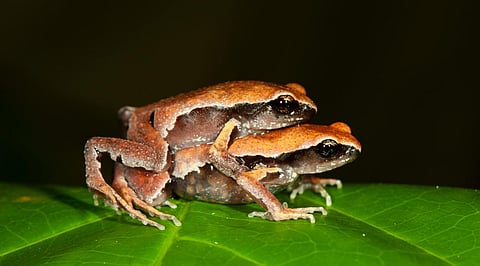

THIRUVANANTHAPURAM: A new international study has put eight species of amphibians found in Western Ghats on the list of endangered species. Among these, a rare frog found in Wayanad, Kerala ‘Franky’s Narrow-mouthed Frog’ (Mysticellus Frank) finds a place on the list of critically endangered amphibians’ list.
Out of the 17 critically endangered amphibians in India, eight species are from the Western Ghats. Of these, five species were discovered by India’s frog man S D Biju and associates. The critically endangered amphibian on the list, Narrow-mouthed Frog, was discovered by Sonali Garg and S D Biju in Wayanad in 2019. This species is endemic to Western Ghats and is known only at a single locality in Wayanad with an estimated extent of occurrence of less than 2 sq km. “Its habitat is under threat due to the expansion of human settlements, agricultural areas and large-scale tea-coffee and spice plantations,” Biju told TNIE.
The study ‘Ongoing declines for the world’s amphibians in the face of emerging threats’ was done by Jennifer Luedtke Swandby, global coordinator of IUCN SSC Amphibian Red List Authority, and coauthored by S D Biju, Radcliffe Fellow, Harvard University, USA.
When the study was carried out, the total number of amphibian species in India stood at 453 species, of which 426 were assessed. Of this, 139 are found to be in the threatened- closer towards extinction category. Of these, 16 species are critically endangered, 72 are endangered and 51 are in the vulnerable category. According to the study, 41 per cent of Indian species are threatened. “Over 70% of Indian amphibians are endemic to the country and found nowhere else. This also means that if these species go extinct, they will altogether vanish from the surface of the Earth,” said Biju.
According to the study, nearly 41 per cent of all amphibian species that have been assessed are currently globally threatened, considered critically endangered, endangered or vulnerable. This is the highest of any vertebrate group.
Globally, between 2004 and 2022, more than 300 amphibians were pushed to the category of closer to extinction. Climate change was the primary threat for 39 per cent of these species. Habitat destruction and degradation have affected 93 per cent of all threatened amphibians.